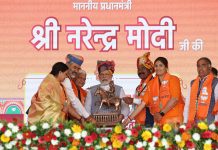 In the hustle and bustle of Delhi, it’s a real pleasure when you stop by where a crowd has gathered to feed pigeons and other birds. In the middle of busy Daryaganj, where many Delhites saunter lazily on Sunday afternoons looking for excellent bargain and sale on books of every variety, you find Delhi’s own Trafalgar Square. Daryaganj is in the walled city; the dariya here refers to River Yamuna. Not an up market area, and certainly not complying at all to Prime Minister Narendra Modi’s Swatch Bharat Mission, it is indeed an extraordinary sight that one encounters here in the mundane canvas of urban life.
In the hustle and bustle of Delhi, it’s a real pleasure when you stop by where a crowd has gathered to feed pigeons and other birds. In the middle of busy Daryaganj, where many Delhites saunter lazily on Sunday afternoons looking for excellent bargain and sale on books of every variety, you find Delhi’s own Trafalgar Square. Daryaganj is in the walled city; the dariya here refers to River Yamuna. Not an up market area, and certainly not complying at all to Prime Minister Narendra Modi’s Swatch Bharat Mission, it is indeed an extraordinary sight that one encounters here in the mundane canvas of urban life.
In kiosks created through jute matting and plastic sheets, one can see a stack of stainless steel plates filled with seven different grains. Each plate costs 10. Of course, you have to return the plates after feeding the birds. These plates are regularly replenished from grain-filled gunny bags kept alongside. Hundreds of pigeons can be seen pecking merrily at the grains thrown into the shallow pit created especially for the purpose.
Shiv Singh, who sells these grain-filled plates, is in his late fifties and sits alongside on a raised platform where hundreds of birds feed on grain being thrown by people. Shiv was a teenager when he came to this city in search of employment. While he never found a job, he managed to create one for himself.
He recalled the story of how, hungry and tired, he bought some roasted gram and was eating it when some fell down on the ground. Soon, he noticed a pigeon circling close by. It came near and started pecking at the grains. The bird was so hungry that it was not intimidated by human presence.
An idea clicked in Shiv’s mind — to become a facilitator between man and nature. He purchased a little more gram and and lured the birds with fists full of grains, throwing some on the ground. Soon a few birds came down and started eating it. The next morning, Shiv was at the same place again with a packet full of grains for the birds.
Come passers by stopped and asked him if they could also feed the birds like him. Shiv happily agreed. When they left they slipped a coin in his hand. Within an hour Shiv had collected a handful of coins. He went back home happy and content. That night he and his family had a full meal, purchased from those coins.
In the years that followed his business grew. He realised the generosity of people, even the poorest of them participated willingly in this ritual and happily shelled out a few coins to feed the birds. Soon some of his family members joined the business. Today there are at least five from his tribe sitting around the area selling the grain plates.
Talking about the bird feeding business, Shiv said, “Yeh pakshi yaha khud nahi aaey, humney inhey bulaya hai (these birds have not come here on their own but I have invited them here). He added that during the last 40 years the birds here have increased from a few to many.
Shiv Singh’s work begins early as birds are early risers. He arrives when dawn breaks and the birds are already there waiting for him, happily pecking on leftover grain from the previous day. From 5 am to 5 pm, Shiv is busy handing out plateful of grains for these winged visitors.
Shiv Kumar claims to be the oldest in this trade. But from 1970 three-four more kiosks have come up. Business is brisk and people generous; each earns anything between 300 to 400 daily.
In the city where the honking of innumerable vehicles constantly reverberates, it is welcome to find chirpy birds making their way into this congested area and flying in for a feed. Every soul that feeds them somewhere deep down hopes that when they fly back, their bellies full, they will remember to thank them in heaven.
letters@tehelka.com













